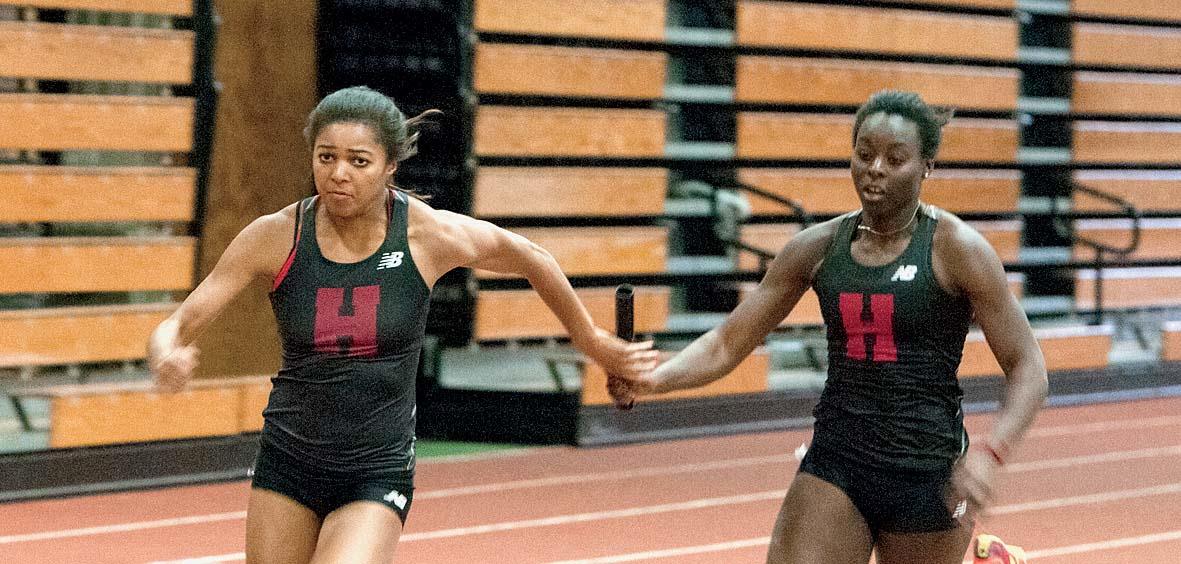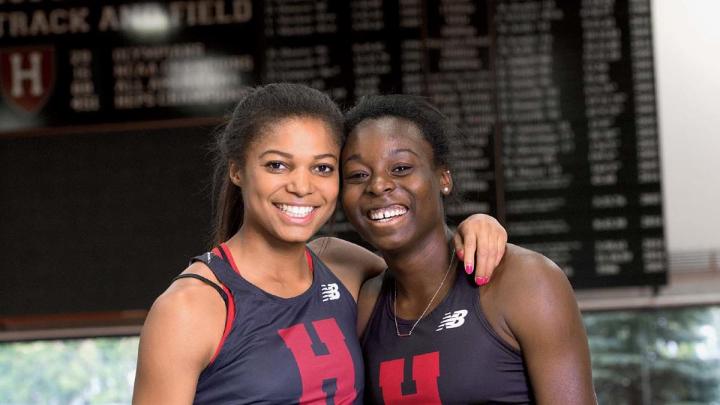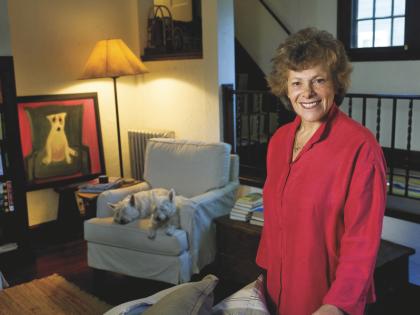In April, sprinter Ngozi Musa, approaching the end of her freshman season on Harvard’s track and field team, was telling a story about the time she set her starting blocks incorrectly at the world junior championships in Eugene, Oregon. It was 2014, her first competition on an international stage, and she thought (wrongly, it turned out) that a tape measure would be prohibited. So she eyeballed it. When the blocks felt strange under her feet right before the race, she assumed it was nerves; not until too late did she realize that their placement was off by 12 inches. “I didn’t run very well, and I remember being angry about it the whole rest of the summer,” she recalled, now able to smile. “It was a lesson never to get my blocks wrong again.”
Sitting next to Musa, her teammate Gabby Thomas laughed. “So that explains why you’re so anal,” she said. A fellow freshman and sprinter, Thomas is Musa’s best friend and closest competitor. She also takes a somewhat more relaxed attitude toward the precise position of starting blocks. “I don’t pay attention to detail that same way, or maybe just to different details,” she said. “If I forget my tape measure, I’ll use my feet or something.”
Then it was Musa’s turn to laugh. “Yeah, she thinks outside the box. But we balance out. She’s the calm and I’m the storm.”
That’s true in many ways, suggests Kebba Tolbert, Harvard’s sprints/hurdles and horizontal jumps coach, describing Musa’s explosiveness and Thomas’s deliberation. “Ngozi’s more tightly wound,” he explains, “a little more powerful, a little more instantaneous. She’s like, boom. Gabby’s smoother. She’s bouncier, more elastic. And much more deliberate.”
In their first season in Cambridge, Musa and Thomas broke multiple Harvard and Ivy League records—some of them multiple times—in the 60-, 100-, 200-, and 300-meter dashes and in 4 x 100-, 4 x 200-, and 4 x 400-meter relays. In May, when the Crimson women brought home their third consecutive outdoor Ivy League Heptagonal title, Thomas won gold in the 100- and 200-meter dash and bronze in the long jump. Both women were part of the 4 x 100 relay that won it all. Thomas made first team All Ivy, Musa second team. In addition, Thomas qualified for this summer’s Olympic trials, while Musa holds the national record in Sierra Leone, where she is a dual citizen (and for whom she competed in the 2014 world juniors), for the indoor 60-meter dash. She can run it in 7. 40 seconds.

Both spent the year shedding old habits to pick up speed.
Photograph by Jim Harrison
Jason Saretsky, McCurdy director of track and field/cross country, talks often about the national ambitions he has for Harvard’s program, how he’d like to see his athletes competing every year for Ivy League championships and beyond. Musa and Thomas are part of that plan, and they shared a roster last season with stars like sprinter Autumne Franklin ’16, hurdler and middle-distance runner Paige Kouba ’16, and shotputter and discus thrower Nikki Okwelogu ’17.
But as freshmen, Saretsky says, Musa and Thomas were unusual. The first year of college can be difficult for track and field athletes; they train hard throughout fall semester, grinding along day after day without the payoff of a meet until December, when the indoor season begins. It’s a brutal stretch, he says, at a time when the new students are also making other hard adjustments. (As a freshman proctor, who lives in the dorms with his wife and two children, Saretsky sympathizes: “I see these kids, and I see the transition they go through.”)
All that can take a toll on first-year runners’ performance. “My usual rule of thumb,” Saretsky says, “is that if they can get back to where they were by the end of their senior year in high school, that’s pretty good.” But Thomas and Musa began breaking records, their own and others, almost as soon as they arrived on campus. “They have far, far exceeded what they did in high school. Part of it is luck, part of it is having each other, and part of it is surviving the fall.”
Having each other is the part both women talk about most. They met in spring 2015 during the Visitas weekend for admitted students, although they didn’t hit it off until they met again, this time as teammates, in the fall. After that, they became inseparable.
“It’s such a blessing to have someone—,” Thomas began.
“Such a blessing,” Musa echoed.
“—that you can compete with at practice and during meets, someone who will push you,” Thomas summed up.
Last season the two trained together 85 percent of the time, and as sprinters they overlap in most events, racing against each other often. Which means that somebody wins and somebody loses: last fall, their teammates told them about another close pair whose friendship eventually foundered because of their competition on the field. Musa and Thomas said they are determined not to let that happen to them.
“It’s hard sometimes when you see someone else’s successes, and you’re like, ‘But me, but me,’” Musa admitted. “But at the same time it’s like, you have to rejoice with those who rejoice and make other people’s successes your successes. I think that’s one thing I’ve really been learning this year: making her successes my successes. Because she’s my best friend. It’s so cool to see how far she’s come and how far she’s going.”
Musa and Thomas both came to track and field through the gateway sport of soccer, where they were the fastest forwards on their childhood teams. When she was nine, Musa’s father, who himself ran track in college, enrolled her and her two older brothers in the Hershey’s Track and Field games. She made it all the way to the nationals in the 50-meter dash and won first place. It was exciting. “So I said, I think I’ll become a runner.”
Thomas’s story is similar, a journey from the soccer field to the racetrack, which she made when she was 13. Her mother, a former high-school high-jumper, pushed her to run, “and then in junior year of high school I realized that I had potential to do well in track, and that’s when I began to think seriously about it as something with a future.”

Thomas and Musa hold Harvard and Ivy League records in the 4x100-meter relay and in May helped win a conference title.
Photograph by Jim Harrison
For each, this past season meant shedding bad running habits they’d picked up in their early years in the sport, and learning to hone their natural gifts: Musa getting rid of a hunched posture that had her pushing down off the blocks, instead of up, and Thomas working to correct a stride that was too long. Tolbert goes down the list: “We’re trying to teach them how to accelerate properly, how to run at top speed correctly. How to be relaxed, and how to run with the correct technical things: where their feet are, where their hips are, the way their arms are, good posture, good rhythms.” The women’s talent is both a blessing and a curse, he says. “The blessing is, you can achieve at a high level. The curse is that sometimes you don’t realize all the work it’s going to take to get to the next level, because the level you’re at came fairly easy.”
That’s the hardest thing about the sport, Musa and Thomas admitted, harder than the long season—it runs the length of the school year and, for postseason competitions, beyond—and the rough practices, harder than the early bedtimes and strict diets their other friends don’t have to keep, and the discipline required for getting homework done before practice, or writing papers on the bus.
Explained Thomas, “It’s just, how much work it takes to change—.”
“The littlest detail,” Musa broke in.
“To get, like, one-tenth of a second better, that’s hours and hours of work,” Thomas said. “Because it’s short sprints, so it’s not like you have any room to mess up and make up for it.”
“Yeah, if you mess up in the 100, you’re done,” Musa added. “And the intensity has to be there, and that you’re executing properly—”
“Like, your foot is cocked at a 90-degree angle, your arm is sitting at the correct position. And if it’s not, then you’ve wasted a run.”
One other thing the two share, which perhaps helped with their transition: midway through high school, both moved across the country when their parents changed jobs—Musa from Wisconsin to Seattle, and Thomas from suburban Atlanta to Northampton, Massachusetts. The move helped Thomas open up to new people; Musa, who initially dreaded the disruption of uprooting after tenth grade, grew to love Seattle so much that she wears a tiny silver pendant in the shape of Washington State on a chain around her neck. “My phrase is always, I want to become more comfortable being uncomfortable,” she said. “Because I feel like, when you’re uncomfortable, that’s when you grow. That’s when you get better.”








